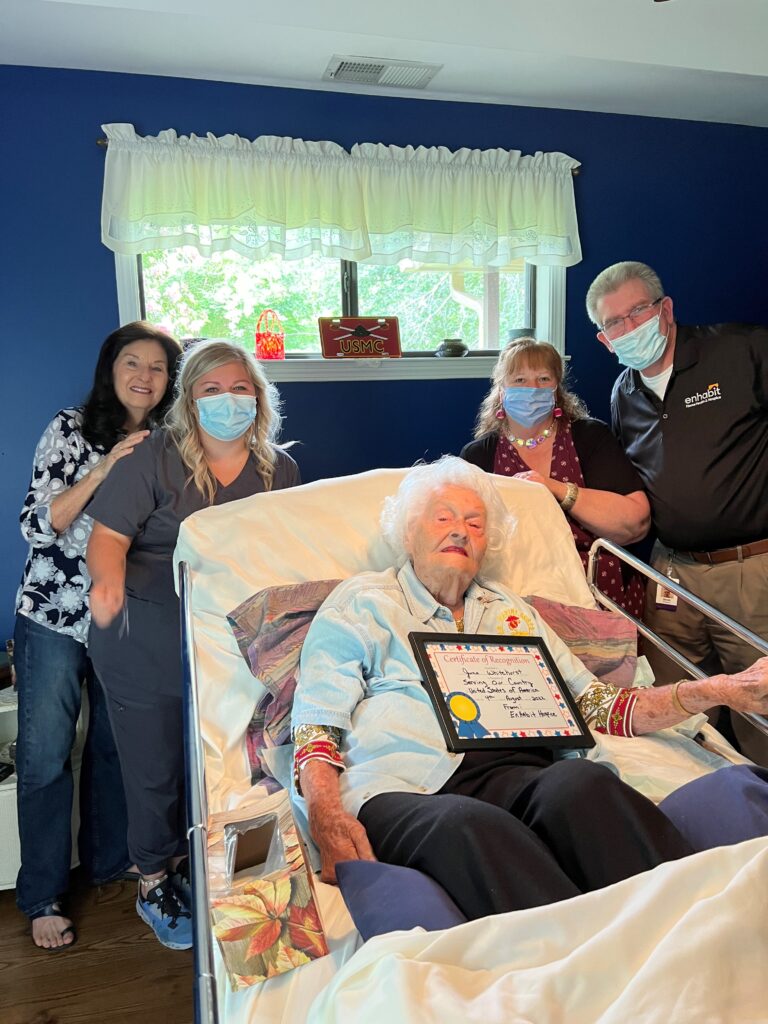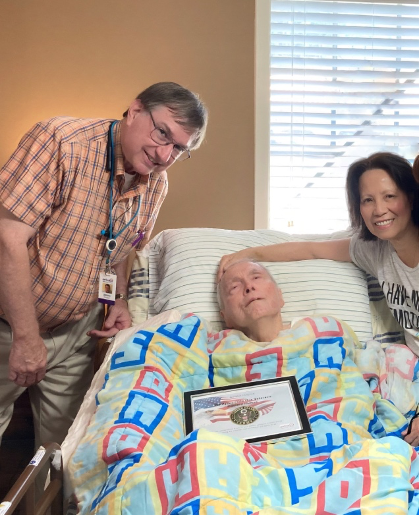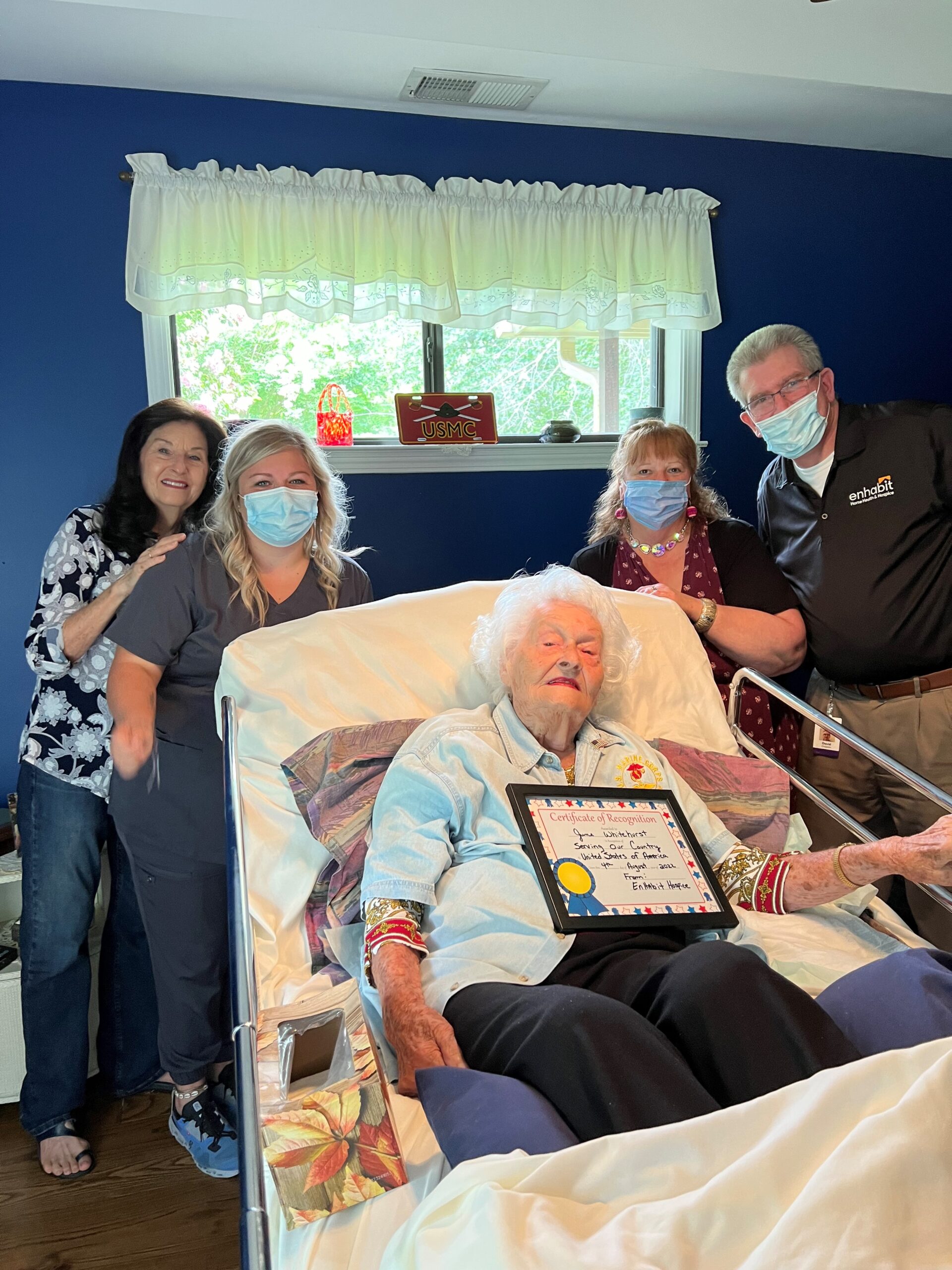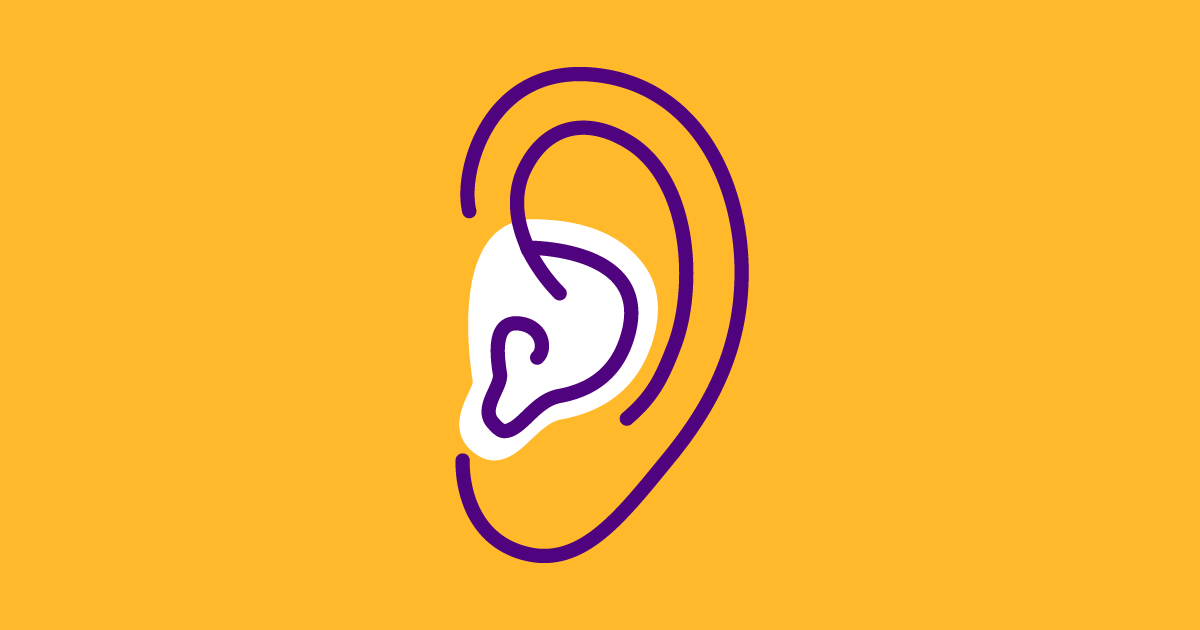The amount of veterans utilizing hospice services has seen an increase in recent years, according to a study from the U.S. Department of Veterans Affairs Home Based Primary Care.
It’s important to understand the unique challenges veterans face at the end of life, as they oftentimes are different than the general population. For example, veterans may be more susceptible to post-traumatic stress disorder or depression, and it is important to recognize these signs and symptoms to get them the appropriate care and resources.
We Honor Veterans
To meet the specific needs of veterans during their hospice journey, Enhabit partners with the We Honor Veterans program, which was created by the National Hospice and Palliative Care Organization in collaboration with the U.S. Department of Veteran Affairs.
The program aims to identify the unique needs of veterans and offer guidance and resources focused on respectful inquiry, compassionate listening and grateful acknowledgment so that veterans can be guided toward a more peaceful ending.
As part of the We Honor Veterans program, Enhabit receives veteran-specific materials to educate hospice staff and increase awareness on the type of care that is needed. Through the We Honor Veterans partnership, Enhabit is also able to celebrate and thank veteran patients in special, commemorative ways.
A common way Enhabit branches show gratitude to veteran patients and their families is by holding a pinning ceremony. A pinning ceremony often consists of a small gathering of Enhabit staff and the patient’s family to present the veteran with a pin and framed certificate. The ceremonies are to celebrate their service and recognize their commitment to this country. Below are stories of pinning ceremonies conducted by the Enhabit team for veteran hospice patients.
Our 99-year-old Marine
June, an Enhabit patient in Mississippi, liked to spend her time reminiscing about how she met her husband while serving in the U.S. Marines. She was a pilot instructor during WWII, teaching young Marines how to fly aircrafts for the war.
In an effort to thank her for her service and honor the impact she had on other Marines, Enhabit held a pinning ceremony, presenting her with a certificate of recognition and a commemorative pin.
Many of the Enhabit team members attended the special occasion, and her hospice chaplain Dave played his guitar to the tune of various patriotic songs. Dawning her U.S. Marines jacket, June held her hand over her heart and sang every word to the songs.
June’s family stood around her and grinned as they watched the pride swell across June’s face. The simple act of recognizing and thanking her for her service meant so much to June and her family.

“It was an honor to celebrate June,” Wendy, volunteer coordinator at Enhabit, said. “A life long-lived and dedicated to this country deserves all of the recognition possible, and I know this ceremony was full of meaning and memories for June and her family. Enhabit was so glad to be a part of something so special.”
A smile when you need it most
Once the Enhabit team in Mississippi, found out Edward – who served in the army during the Korean War – was a veteran, they were eager to celebrate him.
Johnny, a hospice chaplain, and an Enhabit hospice volunteer coordinator pinned Edward in honor of his service and presented him with a framed certificate to thank him for his time in the army. As he was recognized for his contributions, Edward was surrounded by love and family.
Joining him were his wife, children, grandchildren and a room full of contagious smiles.

Though he was bedbound and nearing the end of his life, Edward’s family said this small gesture produced a look of pride on Edward’s face that they hadn’t seen in a long time.
Small moment, lasting impact
During the hospice journey, it can be common for patients to be unresponsive or not as alert as they once were. This was the case for Freeman, a 70-year-old U.S. Air Force veteran who was an Enhabit patient in Alabama.
In the 1970s, Freeman was serving at a base in Texas when he was accidentally shot twice by another soldier. For the past 50 years, Freeman had been on 100% military disability.
Given his remarkable story and journey in the air force, the Enhabit team in Alabama decided to honor Freeman’s service to the nation with a pinning ceremony.
Freeman had been unresponsive for quite some time, but on the day of his pinning, he was awake and alert. Although he couldn’t speak due to aphasia, which refers to the loss of speech caused by brain damage, he made it clear to his Enhabit clinician that he did not want his pin to be removed from his clothes.
So, for the next six months, the clinician removed and reattached the pin to his clothing every day until Freeman passed.
A pinning ceremony might take just a few minutes and a small amount of effort, but the impact that it has on patients and their families is everlasting.
Social Share
At Enhabit our patients are our number one priority. From providing the latest medical practices to building deep personal connections, we’re focused on upholding every patient’s dignity, humanity and sense of control on their health care journey.
Home health
Our home health services give patients access to the care they deserve in the comfort of their own homes. From disease and injury management to recovery from surgery, our clinicians help patients confidently achieve their healthcare goals.
Hospice care
Our hospice care services place importance on the comfort of every patient living with a terminal illness. Our caring professionals are dedicated to providing not just physical care, but spiritual and emotional support to every patient and their loved ones.






